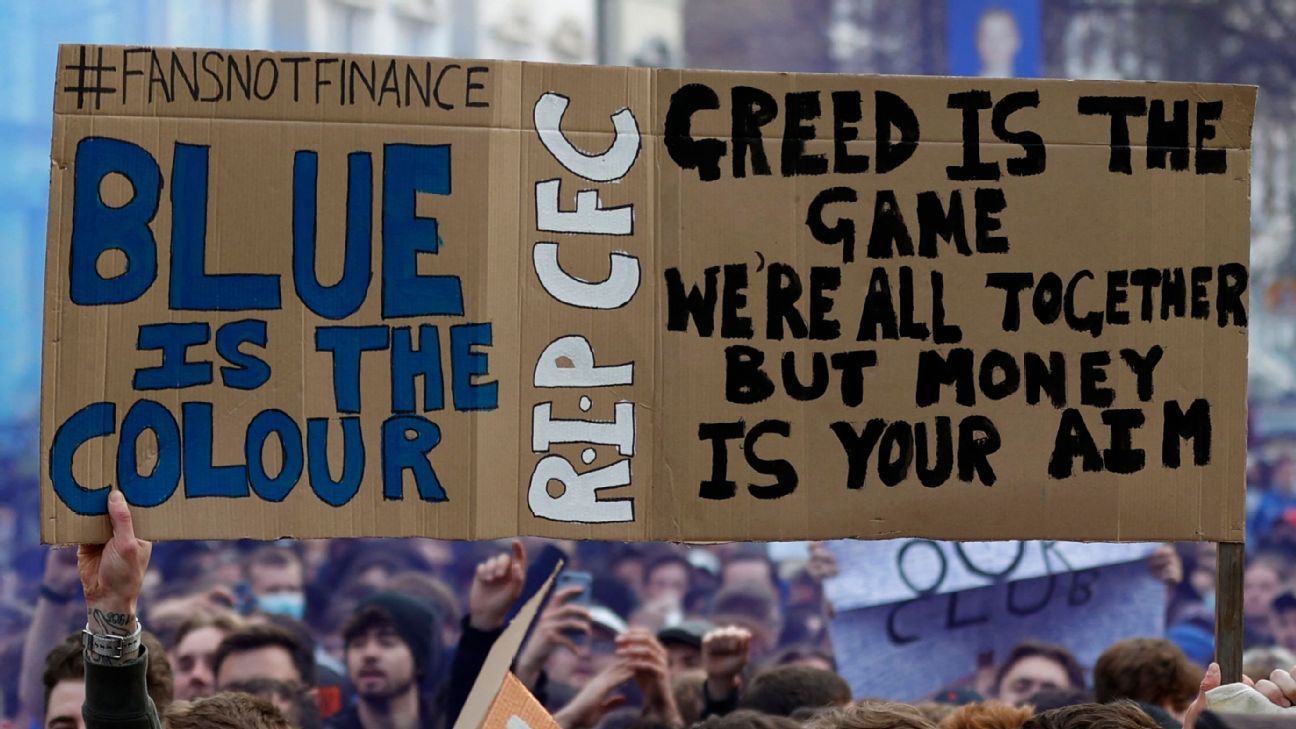Stamford Bridge is an unusual setting for a people’s revolution. Kensington and Chelsea has long been the most expensive borough to buy a house in the United Kingdom, the archetypal rich man’s playground where fantasies like a Super League are dreamt up.
Blues owner Roman Abramovich has done more than most to exacerbate the domestic divide between football’s have and have-nots, investing more than £2 billion since acquiring the club in 2003, achieving a nouveau riche status many readily embrace in these parts. Yet hours before the Blues faced Brighton in the latest fixture of a Premier League which Chelsea had sought to destroy, around 1,000 fans lined the streets armed with banners, smoke bombs and an overwhelming sense of injustice.
– English clubs withdraw from Super League
– Stream ESPN FC Daily on ESPN+ (U.S. only)
“We want our Chelsea back,” they sang as supporters gathered outside the Stamford Gate entrance in sufficient number and vigour to block access to the stadium for the team coach busses. This standoff led to a truly remarkable scene, one which perfectly encapsulates how the Super League has pitched the ordinary supporter against the faceless facet of the club they adore.
As police and stewards held firm against the baying hordes, Petr Cech made his way towards the front line. The ex-Blues goalkeeper, one of the club’s most successful players before returning to become Technical and Performance Director, was suddenly the last line of defence again, this time standing between an angry throng of Chelsea fans and the executives making decisions huddled inside the ground.
“Give everybody time, let people sort this out,” he pleaded, also trapped between wearing a face mask to protect himself from COVID-19 and not wearing one to be heard over the shouting.
The barricades were wavering. Events that followed suggested the decision had already been made but the sense that the people had scored a victory against the odds emerged just a few minutes later when news broke that Chelsea were indeed preparing to become the first club to withdraw from the proposed 12-team breakaway competition they had signed up for 48 hours earlier. Fellow English clubs Manchester City, Arsenal, Liverpool, Tottenham and Manchester United would later announce their intentions to do the same, surely signalling the collapse of the Super League.
Cue unbridled joy on the Fulham Road. Beer was thrown in the air, chants changed to “We’ve got our Chelsea back” and “We’ve saved football.”
One man, a Chelsea supporter of 50 years, described the feeling as better than the club winning the Champions League in 2012.
Details began to follow on a climbdown that begun earlier on. Chelsea signed up having had the urgency to do so impressed upon them by others. This is not to say the Blues had not been privy to these clandestine conversations for some time but rather the pace of change was being driven elsewhere and they were urged to jump aboard a departing train.
Sources suggest Abramovich was never completely sold on the idea. After all, what’s a £350m cheque to him? And the political backlash would leave him even further away from having his UK visa reinstated. It is also believed a group of senior players had already met with chairman Bruce Buck to voice their opposition to the plans, not least due to the suggestion from FIFA and UEFA that players would be banned from international competitions.
The level of opposition from government, authorities, fans and essentially anyone with even a passing interest in the game exceeded their expectations. And faced with the physical manifestation of that hostility at their gates, Chelsea reversed course.
The furore outside had helped push back the Super League indefinitely but kick-off against Brighton by only 15 minutes. And the context of this game changed after the owners decided about an hour before that it suddenly mattered. Chelsea entered the day a point behind fourth-place West Ham and scrambling to qualify for next season’s Champions League, suddenly recognised as Europe’s pre-eminent club competition once again.
What followed was a 0-0 draw in which Brighton were competitive throughout in a manner the ‘Big Six’ apparently don’t like. The visitors had Ben White sent off in stoppage time but held firm for a point that takes them closer to Premier League survival. The whole league is closer to survival now.
“I was affected so I think the players were affected. We talk of nothing else but Super League before the match. Nobody asked about the match before,” said Chelsea manager Thomas Tuchel.
“It is like this. You have to accept the distraction. We tried to create an atmosphere to win the game but could not.”
Of course, Chelsea have done more than most to accelerate the gap between the modern-day ‘Big Six’ and the rest of the Premier League. Abramovich delivered an assault on the established order, transforming Chelsea into a member of the elite seeking to pull up the drawbridge. And so there are many relationships to mend in the weeks and months ahead, both with their own fanbase and further afield as the Super League looks doomed to failure.
By full-time, Chelsea still had not officially confirmed their withdrawal, presumably as lawyers sought to untangle the mess they have got themselves into, tearing up the paperwork of a footballing vision so short-sighted it couldn’t see the opposition closest to it.
But the people had already spoken. And, finally, they were heard.
